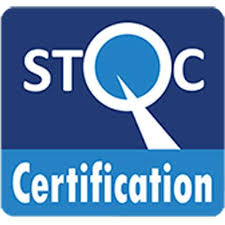your one-stop certification solution!
What is STQC Certification for India?

The Standardisation Testing & Quality Certification (STQC) Directorate is an authority under the Indian Ministry of Electronics & Information Technology (MeitY). It operates a network of testing and calibration laboratories as well as certification bodies for electronics and IT products as well as e-government systems.
The “STQC certification” is a series of programs that are used to test the quality, security and interoperability of IT products and services.
What is STQC needed for?
STQC certifications are mandatory if Indian authorities specify it in laws, guidelines or programs . Typical use cases are:
- Aadhaar/UIDAI ecosystem:
Biometric devices (e.g. fingerprint and iris scanners), registered device services and QR code scanners for Aadhaar must be certified according to STQC rules. - IT security products:
The Indian Common Criteria Certification Scheme (IC3S) tests IT security products according to international Common Criteria. - E-government websites:
The Quality Certification (WQC) website demonstrates compliance with the GIGW guidelines . - Product safety:
The S-Mark program checks electrical safety according to IEC standards. - Smart cards and IoT:
Separate programs exist for smart cards (e.g. e-passport, driver’s licenses) and for IoT systems. - Transport & Payment:
STQC certifies parts of the National Common Mobility Card (NCMC) ecosystem.
STQC Certification types at a glance
- Biometric Device Certification (BDCS) & QR scanner
mandatory for Aadhaar-enabled devices; includes functionality, safety, EMC testing, and ongoing monitoring. - Common Criteria (IC3S)
International security certification of IT products; India is a CCRA member, STQC is a certification body. - Website Quality Certification (WQC)
Testing of government websites for quality, safety and accessibility; The result is the CQW mark (valid for 3 years, annual monitoring). - S-Mark certification
of electrical/electronic products according to IEC safety standards; Valid for 3 years with annual monitoring. - Smart Card Certification (SCOSTA)
For smart cards in administration and identity systems, in collaboration with NIC. - IoT System Certification Scheme (IoTSCS)
Security assessment of IoT devices and systems with tiered levels (L0–L3). - NCMC certification
Certification of certain modules in India’s “One Nation, One Card” public transport and payment program.
STQC Certification Process
Application: Submission of forms and technical documentation.
Document review: Assessment by STQC.
Tests and audits: Product/system tests in STQC laboratories, factory audits if necessary.
Certification: Issuance of the certificate and entry in the STQC register.
Monitoring: Annual inspections or re-assessments depending on the program.
STQC Validity and marking
- BDCS & QR scanner: Surveillance planned for 3 years.
- WQC (CQW): valid for 3 years, annual monitoring.
- S-Mark: valid for 3 years, two surveillances per year.
- Characteristics: CQW logo for websites, S-Mark for products, BDCS logo for biometric devices.
STQC relevant Products
STQC certification is mandatory if Indian authorities require it in laws, guidelines or programs . Typical use cases:
- Aadhaar/UIDAI ecosystem:
Biometric devices (fingerprint and iris scanners), Registered Device Services and QR code scanners for Aadhaar offline verification. - IT security products:
Certification via the Indian Common Criteria Certification Scheme (IC3S) according to international standards. - E-government websites:
Website Quality Certification (WQC) based on the GIGW guidelines. - Product safety:
The S-Mark program tests electrical safety according to IEC standards. - Smart cards:
Certification for applications such as driver’s license, registration, e-passport or national identity programs. - IoT systems:
Security certification for devices and platforms via the IoT System Certification Scheme (IoTSCS). - Transport & Payment:
Certification of components under the National Common Mobility Card (NCMC) program. - Digital Health Solutions:
Mandatory certification for products that are used productively as part of the ABDM/NDHM program.
MPR Services
Your One-Stop Certification Solution.
Our complete package for product certifications for India.
Personal consultant for all questions about STQC
Clarification of the certification requirements
Application preparation
Preparation and support for the audit
Organization of testing
Support during surveillance, renewals and change management.
Contact us!
MPR India Certification – expert consulting and implementation of certification projects worldwide.
STQC Certification FAQ
BIS is the national standards and product certification authority, while STQC is specifically responsible for electronics, IT security and e-government systems .
Only if a legal or regulatory requirement requires it (e.g. Aadhaar devices, government websites, NCMC). Other programs such as S-Mark are voluntary.
Usually 3 years, with annual monitoring.
Some programs require the applicant to be a legal entity registered in India (e.g., BDCS).
In the official registries of STQC, IC3S and UIDAI.
Client Testimonials
Please enable cookies to enable embedded YouTube videos. For privacy-related details on data exchange through use of the videos as well as changeable cookie settings, please see the privacy policy page.








